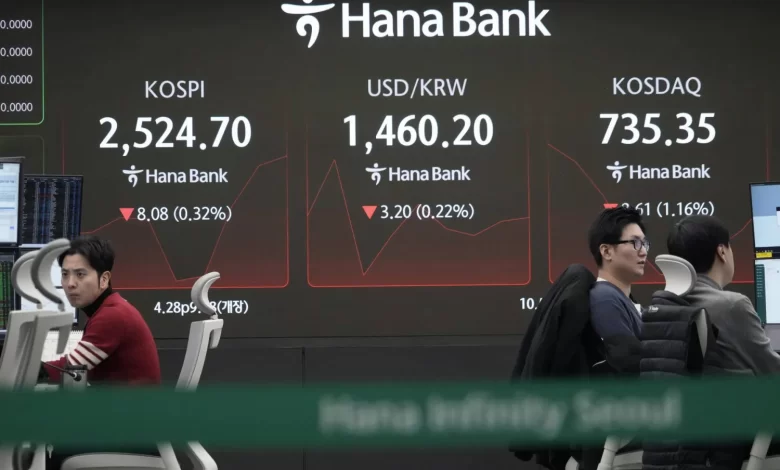Asian Markets Decline as New U.S. Tariffs Take Effect

Sudan Events – Agencies
Asian markets saw a decline in stocks and a drop in bond yields on Tuesday, with investors fleeing to safer assets, coinciding with the implementation of new U.S. tariffs on Canada, Mexico, and China, which threaten to escalate global trade tensions.
The risk-sensitive Australian dollar fell, while crude oil prices dropped, nearing their lowest levels in 12 weeks. Meanwhile, Bitcoin stabilized around $86,000 after losing the momentum that had driven it to a peak of $95,000 earlier in the week, according to Reuters.
In currency markets, the British pound held steady near its highest level in a month and a half, while the euro remained strong, supported by European leaders’ initiative to propose a peace plan for Ukraine to Washington.
As for Asian stocks, Japan’s Nikkei index fell by 1.6%, while Taiwan’s benchmark index dropped by 0.5%. The Hong Kong Hang Seng Index declined by 0.4%, while major Chinese mainland stocks lost 0.2%.
These declines followed the biggest losses in Asian markets on Wall Street this year on Monday evening, where the S&P 500 dropped by 1.8%, and the tech-heavy Nasdaq fell by 2.6%.
However, U.S. futures showed signs of recovery, rising by about 0.2%, indicating that the selling wave might dissipate later in the day. In contrast, European markets were poised for a lower opening, as futures for the Euro Stoxx 50 index indicated a 0.8% drop.
These market moves came after U.S. President Donald Trump confirmed on Monday that the new 25% tariffs on Canada and Mexico would take effect starting Tuesday morning, along with a doubling of tariffs on China to 20%.
This decision raised concerns among investors about its potential impact on the U.S. economy, especially in light of a series of weak economic data in recent weeks. The concerns intensified on Monday after data showed the factory gate price index had reached its highest level in nearly three years, along with delays in material deliveries, which could signal the effect of tariffs on domestic production.
Despite the sharp declines in early trading, Asian stocks reduced their losses, benefiting from a balanced reaction to the tariffs imposed by Trump. However, Beijing immediately announced counter-tariffs, a move also adopted by Canada.
In this context, Wang Zhou, a partner at Shanghai Chuzhou Investment Management, stated that higher Chinese tariffs “could harm the U.S. itself, as it relies on cheap Chinese products to curb inflation.” He added that “higher tariffs on U.S. agricultural products would also negatively impact China, but countermeasures are politically necessary, so it is wise to take symbolic steps without escalating tensions.”
In currency markets, the Canadian dollar and Mexican peso both declined, while the Australian dollar fell to its lowest level in a month. On the other hand, the Chinese yuan recovered from its lowest level since February 13 in offshore trading, as the People’s Bank of China continued to steer the currency towards greater stability through official fixing.
The euro remained stable at $1.0484, after rising 1.1% on Monday, while the British pound stayed at $1.2697, following a 1% gain.
In bond markets, U.S. Treasury yields continued to decline during Asian trading on Tuesday, with the yield on 10-year bonds dropping to its lowest level since October at 4.115%.
In the cryptocurrency market, Bitcoin traded at $84,220, as optimism about the U.S. strategic cryptocurrency reserve quickly faded, just one day after Trump reignited hopes through a social media post mentioning five digital currencies, including Bitcoin, as part of his economic plan.



